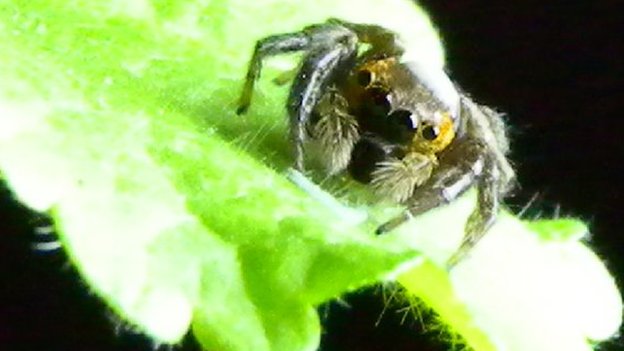|
稿源:2013-8-7/BBC News/Victoria Gil
 The team studied the common Adanson's jumping spider, also known as a "house jumper"(see high-speed video) The team studied the common Adanson's jumping spider, also known as a "house jumper"(see high-speed video)
|
Slow-motion footage revealed the spiders used their silk draglines to stabilise their bodies and to brake, enabling them to land poised and ready to pounce on prey.
The discovery, the scientists say, could inspire new robot design.
It is published in the Royal Society journal Interface.
Kai-jung Chi, from National Chung Hsing University in Taiwan, and her colleagues investigated the jumping ability of Adanson's house spider, a common arachnid that jumps when it hunts, in order to surprise its prey.
Ultimately, Dr Chi and her team hope to learn exactly how these creatures fine-tune and control their jumping manoeuvres, to aid the design of miniature robots able to move in similar ways.
Dr Chi's colleague, PhD student Yung-Kang Chen, filmed the spiders at 1,000 frames per second, and slowed down the resulting footage. They compared the movements of the Adanson's spider with those of a species of jumping spider that does not use a silk dragline.
"We analysed the motion and body orientation throughout the jumps," Dr Chi told BBC News.
This revealed that the Adanson's spider used its dragline to control the orientation of its body mid-air and to brake as it landed.
The non-silk jumping spider would often lose balance - tipping forward and onto its back upon landing.
"[The silk means that the spiders] can land in the optimal position to rapidly initiate prey capture," Dr Chi said.
The results, she said, suggested that the spiders were taking up the slack in their silk dragline by using the valve in their spinning system.
These super-fast adjustments mean that silk provides more than just a safety line for a jumping spider.
Dr Chi said that the "adjustable silk tension" could provide "biological inspiration" for future manoeuvrable robot design.
|